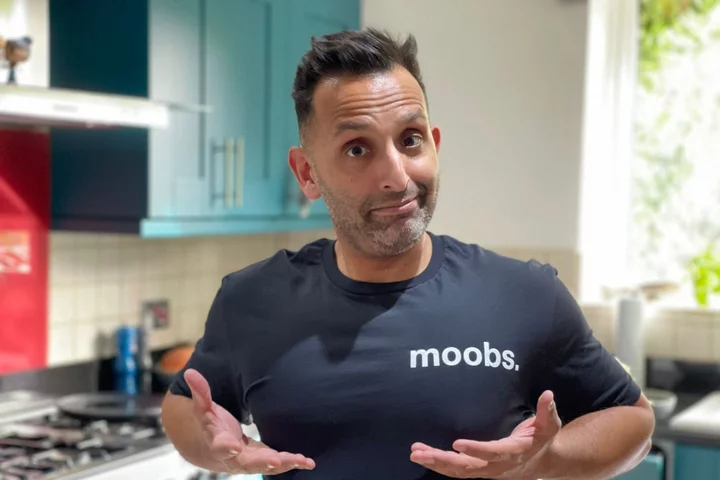
Scientists could use lunar dust to make roads on the moon
Scientists have come up with a potential solution to deal with dust on the moon which makes conducting research tricky. Dust erodes space suits, clogs machinery, interferes with scientific instruments and makes moving around on the surface difficult. But they reckon moon dust could be melted using a giant lens developed by the European Space Agency to create solid roads and landing areas. Using a fine-grained material called EAC-1A, developed as a substitute for lunar soil, scientists used a 50mm diameter laser beam to heat the dust to about 1,600C and melt it. Then they traced out bendy triangle shapes, which could be interlocked to create solid surfaces across large areas of lunar soil to be used as road. However it would take about 100 days to create a 10 x 10m landing spot so it is not a quick fix. To make matters worse, the lens needed for the laser to work would be difficult to transport from Earth and could also get dust in it which may reduce its functionality. “You might think: ‘Streets on the moon, who needs that?’” said Prof Jens Günster, of the Federal Institute of Materials Research and Testing in Berlin and co-author of a report on the possible solution. “But in fact it’s a kind of depressing demand [even] early on. It’s very loose material, there’s no atmosphere, gravity is weak, so the dust gets everywhere. It contaminates not only your equipment but other nations’. No one would be happy to be covered in dust from another rocket." Dust has blighted previous missions, such as the Surveyor 3 spacecraft (damaged by dust kicked up by the Apollo 12 landing), and overcoming this challenge is a priority for Nasa, which aims to establish a permanent lunar outpost. Transporting building materials to the moon would be too expensive, so there is a need for unconventional solutions. “You need to use what’s there and that’s simply loose dust,” said Günster. The findings are published in the journal Scientific Reports. Sign up to our free Indy100 weekly newsletter Have your say in our news democracy. Click the upvote icon at the top of the page to help raise this article through the indy100 rankings.
2023-10-13 20:15

EU opens an investigation into Elon Musk's X over 'disinformation'
The EU has opened an investigation into Elon Musk's X over the possible spread of terrorist and violent content, and hate speech, after Hamas' attack on Israel. The EU's industry chief, Thierry Breton, confirmed on Thursday the bloc had sent Twitter/X a "formal request for information" to determine whether the platform was complying with the Digital Services Act (DSA) - a law designed to protect users of big tech platforms which came into effect November, as misinformation about the conflict between Israel and Hamas spreads on social media. In a statement on Thursday, the EU said “the European Commission services sent to X a formal request for information under the Digital Services Act (DSA)”. “This request follows indications received by the Commission services of the alleged spreading of illegal content and disinformation, in particular the spreading of terrorist and violent content and hate speech. The request addresses compliance with other provisions of the DSA as well.” In his letter to Musk, Breton said "violent and terrorist content" had not been taken down from X, despite warnings. Breton did not give details on the disinformation he was referring to in the letter, but said instances of "fake and manipulated images and facts" were widely reported on the social media platform. Responding on X, Musk said: "Our policy is that everything is open and transparent, an approach that I know the EU supports. "Please list the violations you allude to on X, so that the public can see them." X chief executive Linda Yaccarino also said earlier on Thursday the platform had removed hundreds of Hamas-affiliated accounts and taken action to remove or label tens of thousands of pieces of content since Saturday's attack. Sign up to our free Indy100 weekly newsletter Have your say in our news democracy. Click the upvote icon at the top of the page to help raise this article through the indy100 rankings.
2023-10-13 18:29

'I wanted it to feel like a final send-off': Kevin Greutert regards Saw X as Jigsaw's farewell
Kevin Greutert considers his new movie 'Saw X' to be a farewell for Tobin Bell's legendary antagonist Jigsaw.
2023-10-13 17:21

'We might do one more adventure': Sir Patrick Stewart pleads for another Star Trek movie
Sir Patrick Stewart wishes to reprise the role of Captain Jean-Luc Picard in one last 'Star Trek' movie.
2023-10-13 17:19

Toyota, Idemitsu to Mass-Produce Solid-State Batteries
Toyota Motor Corp. and Idemitsu Kosan Co. are jointly developing the technology and manufacturing facilities needed to mass-produce
2023-10-13 16:28

A scientist may have just proven that we all live inside a computer simulation
“The Matrix is everywhere. It is all around us. Even now in this very room." So says Laurence Fishburne’s Morpheus in sci-fi classic ‘The Matrix’ as he offers Keanu Reeves’s Neo the choice to find out just how “deep the rabbit hole goes”. Now, just as Neo discovered that the "life" he'd been living was little more than an algorithmic construct, scientists and philosophers are arguing that we could be stuck inside a simulation ourselves. In a paper published earlier this month, physicist Melvin Vopson, of the University of Portsmouth, offered scientific evidence for a philosophical theory known as the simulation hypothesis. This, in a nutshell, posits that the entire universe and our objective reality are just super-advanced virtual reality illusions. Elon Musk is among the well-known fans of the theory, which – as Dr Vopson notes in his paper – has been “gaining traction in scientific circles as well as in the entertainment industry”. The university lecturer also pointed out that recent developments in a branch of science known as information physics “appear to support this possibility”. Information physics suggests that physical reality is made up of bits of information. However, Dr Vopson has gone further and is working to prove that information has a physical mass and is a fundamental building block of the universe. He even claims that information could be the mysterious dark matter that makes up almost a third of the universe. In previous research, the physicist proposed that all elementary particles (the smallest known building blocks in the universe), store information about themselves, much like DNA in humans. Then, in 2022, he discovered a new law of physics, christened the second law of infodynamics, which states that entropy – the degree of randomness or disorder – within an isolated information system either remains constant or decreases over time. In other words, the system becomes less and less chaotic, implying that there is some kind of mechanism governing it rather than random chance. “I knew then that this revelation had far-reaching implications across various scientific disciplines,” Dr Vopson said in a statement released by the University of Portsmouth. “What I wanted to do next is put the law to the test and see if it could further support the simulation hypothesis by moving it on from the philosophical realm to mainstream science.” Is the Universe a Simulation? | Melvin Vopson www.youtube.com Dr Vopson employed the law in a range of different fields, including genetics, cosmology and even symmetry. Here, he found that the abundance of symmetry in the Universe (think snowflakes and facial structures) could be explained by the second law of infodynamics. "Symmetry principles play an important role with respect to the laws of nature, but until now there has been little explanation as to why that could be,” he said. “My findings demonstrate that high symmetry corresponds to the lowest information entropy state, potentially explaining nature's inclination towards it." Again, put simply, nature prefers things to be as well-ordered as possible. He continued: “This approach, where excess information is removed, resembles the process of a computer deleting or compressing waste code to save storage space and optimise power consumption.” As a result, this “supports the idea that we’re living in a simulation.” Dr Vopson is serious about this idea and, last year, even launched a crowdfunding campaign to test it. At the time, he announced that he had designed an experiment to determine whether we are all just characters in an advanced virtual world. “There is a growing community out there looking seriously at the possibility that information is more fundamental to everything than we think,” he said in a statement released back in December. “If information is a key component of everything in the universe, it would make sense that a vast computer somewhere is in control. “Assuming the universe is indeed a simulation, then it must contain a lot of information bits hidden everywhere around us. I’ve devised an experiment that proposes a way of extracting this information to prove it’s there.” His proposed experiment is based on his conclusion that information is physical and that elementary particles have a DNA of information about themselves. He posited that the information in an elementary particle could be detected and measured by using particle-antiparticle collision. “We can measure the information content of a particle by erasing it. If we delete the information from the particles, we can then look at what’s left,” he said in the December statement. “This experiment is highly achievable with our existing tools, and I’m hoping the crowdfunding site will help us achieve it.” And whilst the crowdfunder closed well before reaching its proposed £185,000 target, Dr Vopson still hopes to carry out the ambitious test. Following his most recent paper, he suggested the experiment had the power to confirm the “fifth state of matter in the universe” and “change physics as we know it.” Sign up for our free Indy100 weekly newsletter Have your say in our news democracy. Click the upvote icon at the top of the page to help raise this article through the indy100 rankings.
2023-10-13 16:28

Online apps recommended to manage lower back pain
Online apps have been recommended to help people with lower back pain in a bid to tackle NHS waiting lists. Seven platforms have been given the green light for people over the age of 16 to manage their condition in early value assessment guidance published by the National Institute for Health and Care Excellence (Nice). According to the NHS Long Term Plan, lower back pain is the biggest cause of disability and is thought to account for about 30% of GP consultations every year. England affected by long-term back pain" data-source="UKHSA"> UK Health Security Agency (UKHSA) figures show there are 9.11 million people living with long-term back pain in England. Nice said it hopes its guidance will work towards reducing inequalities in care for musculoskeletal conditions. It also hopes the move could reduce NHS waiting lists, as well as bringing down the number for people using medication or waiting for GP or physiotherapy appointments. On Thursday, it emerged that a record 7.75 million people in England were waiting to start NHS treatment at the end of August. The digital platforms our committee has recommended could provide the NHS with extra capacity to get those effected off waiting lists, which vary in length across the country, and into treatment Mark Chapman, Nice Mark Chapman, interim director of medical technology and digital evaluation at Nice, said: “More than two million people suffer from low back pain each year and there are considerable pressures on NHS services to provide the treatment and care to those needing support with this debilitating condition. “The digital platforms our committee has recommended could provide the NHS with extra capacity to get those effected off waiting lists, which vary in length across the country, and into treatment. “We believe these technologies have the potential to offer value for money for the taxpayer, while offering people with low back pain quicker access to get the care they need at a time and place of their choosing.” The platforms recommended for NHS use are ACT for PAIN, getUBetter, Hinge Health, Kaia, Pathway through Pain, selfBACK and SupportBack. Some of the apps are designed for people with new back pain, while others are aimed at those with chronic back pain. These apps are yet another example of how technology can be used help patients get the care they need, when they need it Health minister Will Quince The platforms offer access to multi-disciplinary teams, along with guided exercise videos, and reminder functions for patients to do tasks such as filling in questionnaires. Health minister Will Quince added: “These apps are yet another example of how technology can be used help patients get the care they need, when they need it. “They offer a range of services which will allow patients to manage lower back pain from the comfort of their homes by improving access to musculoskeletal services – which will form a key part of our Major Conditions Strategy. “This will help to reduce pressures on the NHS and can help to cut waiting lists – one of the government’s top priorities – and will help people to live happier, healthier lives.” The technologies recommended in the guidance can be used once they have appropriate regulatory approval and meet the standards within NHS England’s Digital Technology Assessment Criteria, Nice said. The watchdog also recommends lower back pain self-management, exercise, manual therapies, psychological therapy, and combined physical and psychological programmes as well as return to work programmes. Denice Logan Rose, executive director of BackCare (National Back Pain Association), said: “Very many people living with non-specific low back pain feel that they have nowhere to turn for help, they are desperate and are at a complete loss about what they can do to help themselves. “Apps form a significant part of the technology-driven world we live in and if they can be used to help people living with back pain to lead more pain-free and active lives, this is a huge step forward.” Read More From choppy bobs to fox red, 5 celebrity-approved hair trends for autumn The UK’s first dedicated male breast cancer organisation has launched – here’s why it matters How Taylor Swift’s style has evolved over the years Model Emily Ratajkowski unveils latest fashion campaign 10 ways to cosy-up your home for an autumnal vibe 5 must-have bag trends for autumn
2023-10-13 16:25

Baz Luhrmann expands Australia into TV series using unseen footage
Director Baz Luhrmann has expanded his movie epic Australia into a six-part TV series TV series using unseen footage rescued from the cutting room floor
2023-10-13 15:22

Jeymes Samuel's Book of Clarence 'littered' with Easter eggs for next film
Jeymes Samuel's 'The Book of Clarence' is "littered" with clues about his next movie, a prequel to his debut 'The Harder They Fall'.
2023-10-13 15:21

'Dad. They shot me. Help': Surviving the Kfar Aza kibbutz massacre
Neta had not spoken to her father for years, but she knew he was the only person who could save her.
2023-10-13 14:48

The UK’s first dedicated male breast cancer organisation has launched – here’s why it matters
Lorraine regular Dr Amir Khan and This Morning’s Dr Zoe Williams have joined forces to support the launch of the UK’s first ever dedicated male breast cancer organisation. Called Moobs, the organisation was founded by James Richards, 37, who is currently undergoing treatment for the disease after being diagnosed in February, aged 36. Moobs’ main mission is to raise awareness of breast cancer amongst men, and provide a helpful resource for men who get diagnosed. The organisation also runs a monthly support group via Zoom, to ‘help reduce the isolation’ for men affected. “As a male, I’ve always been aware of the risks of prostate and testicular cancer, but I had no idea men were able to get breast cancer – you just don’t hear of it,” said Richards. “In the days following my diagnosis, I was surprised by the lack of tailored support and information readily available around the disease, and much of my treatment plan was based on what was offered to women. “There are differences, but with so few cases and a lack of funding for male breast cancer, we are in danger of isolating those that need support the most.” Around 55,000 women are diagnosed with breast cancer each year, making it the most common form of cancer in the UK. There are also around 400 new diagnoses a year in men – yet awareness of the condition in males is much lower. It’s believed this is contributing to men being less likely to see their doctor when early signs arise, and a 2019 US study found male breast cancer patients have a 19% higher mortality rate than women. As with women, male breast cancer tends to mostly affect older men, aged 60-70. However, it can potentially occur in younger men too, so being aware of the symptoms is important for everyone. Checking for signs When it comes to checking for warning signs, Dr Amir Khan said it’s “very similar” for both men and women. “I always say to women, be ‘breast aware’ – so that’s knowing what’s normal for you, and then being aware of any changes and getting them checked, and it’s exactly the same for men,” Khan told the PA news agency. “[Often] men don’t know that they’ve got breast tissue – but all men have breast tissue, and that means they’re at risk of getting breast cancer. It is a much lower risk than in women, but the risk is still there. “So what I would say to men is, just as often as you check your balls for any lumps, you should be checking your breasts as well. Do them both – balls and breasts – in the shower, once a month.” Khan explained that the “majority of the breast tissue in men is located around the nipple area -so that is the part you need to be hyper vigilant about” when checking for changes. “But saying that, you should be checking the whole of your chest area, right up to the collarbone and under your arm. “As well as that, nipple changes are really important too – so if one nipple has suddenly changed, if it’s pointing inward instead of outward, or if there’s any skin dimpling, any new unexplained rashes around the breast area, or even unexplained persistent breast pain or chest pain, get that checked out.” See your GP While these things don’t mean you definitely have cancer, it’s always best to get things checked with your GP quickly. “We will be able to either reassure you, or make that onward referral. And it is incredibly rare – we’re talking 400 or so men each year diagnosed with breast cancer,” Khan added. “But it’s always better to be safe than sorry, and the longer you leave it [if it is cancer], sadly, the worse the outcome is likely to be. So as soon as you pick anything up, go and see someone.” For more information, visit moobs.uk Read More How Taylor Swift’s style has evolved over the years Model Emily Ratajkowski unveils latest fashion campaign 10 ways to cosy-up your home for an autumnal vibe 5 must-have bag trends for autumn Dawn O’Porter: ‘I fantasise about the other side of menopause’ Everything you need to know about bedbugs as increase in numbers is predicted
2023-10-13 13:29

Phillies troll Braves and Orlando Arcia with hilarious shirt during clubhouse celebration
The Atlanta Braves gloated after a Game 2 victory over the Philadelphia Phillies. It would wind up being their only win of the NLDS. In fairness, the Braves ha
2023-10-13 12:26
